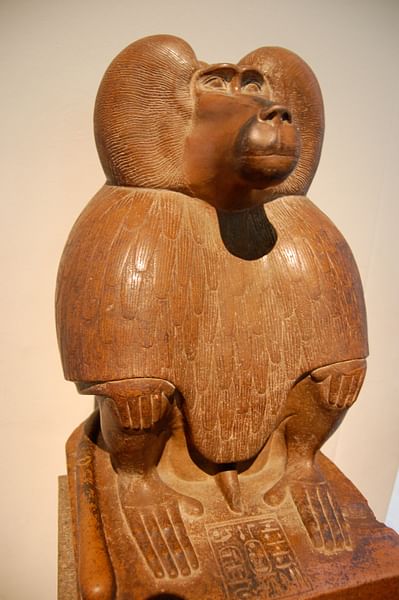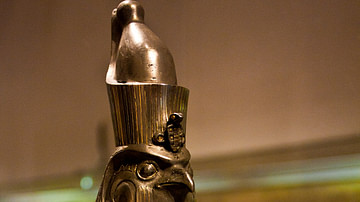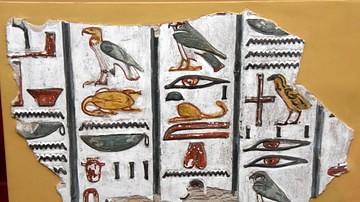
Thoth is the Egyptian god of writing, magic, wisdom, and the moon. He was one of the most important gods of ancient Egypt alternately said to be self-created or born of the seed of Horus from the forehead of Set. As the son of these two deities (representing order and chaos respectively) he was also god of equilibrium.
In this regard, he was also associated closely with both the principle of ma'at (divine balance) and the goddess Ma'at who personified this principle (and who was sometimes seen as his wife). Another of his consorts was the goddess Nehemetawy ('She Who Embraces Those In Need") a protector goddess. In his form as A'an, Thoth presided over the judgment of the dead with Osiris in the Hall of Truth and those souls who feared they might not pass through the judgment safely were encouraged to call upon Thoth for help. The consort most often associated with Thoth was Seshat, goddess of writing, the keeper of books, and patron goddess of libraries and librarians who was alternately his wife or daughter.
Worship of Thoth began in Lower Egypt most likely in the Pre-Dynastic Period (c. 6000-3150 BCE) and continued through the Ptolemaic Period (323-30 BCE), the last dynastic era of Egyptian history, marking Thoth's veneration as among the longest of the Egyptian gods or any deity from any civilization. His name was often taken by the kings of Egypt (example, Tuthmoses - "Born of Thoth"), scribes, and priests. He is most commonly depicted as a man with the head of an ibis or a seated baboon with or without a lunar disc above his head. He was the patron god of scribes and it was said that scribes would pour out one drop of their ink in Thoth's honor before they began their daily work.
Name & Origin
Thoth's Egyptian name was Djehuty (also dhwty) meaning "He Who is Like the Ibis". The ibis was a sacred bird in ancient Egypt as well as a popular pet and associated with wisdom. Other forms of his name are Jehuti, Tahuti, Tehuti, Zehuti, Techu, Tetu, and Lord of the Khemenu (the later city of Hermopolis) which was his major cult center. Hermopolis was so named because of the Greek association of Thoth with their god Hermes and to the Greeks Thoth became Hermes Trimegistus (Thoth the Thrice Great often given as "Three Times Great, Great"). He was also known as "Lord of Ma'at", "Lord of Divine Words", "Scribe of Ma'at in the Company of the Gods", and as a just and incorruptible judge.
According to one story, Thoth was born "from the lips of Ra" at the beginning of creation and was known as the "god without a mother". In another tale, Thoth is self-created at the beginning of time and, as an ibis, lays the cosmic egg which holds all of creation. He was always closely associated with Ra and the concept of divine order and justice. In a third story, The Contendings of Horus and Set (an Egyptian manuscript from c. 1190-1077 BCE), when Horus and Set are fighting for the right to rule, Thoth is said to have been created from the semen of Horus which was accidentally swallowed by Set during the struggle.
Thoth was born from Set's forehead and, in some versions, then mediated the struggle between the gods (in other versions the battle between Horus and Set is resolved by Neith and, in others, by Isis). In every version, Thoth is the scribe who records the events of the contest and offers advice to the gods. He heals both Horus and Set at different times in their battle in order to make sure that both sides are equally capable and none can gain advantage over the other so that the contest will be fair. In this same way, Thoth presided over justice on earth among human beings. Egyptologist Geraldine Pinch writes:
Thoth set a divine example as a just judge and an incorruptible official. He lifted Ma'at, the goddess of justice, to her father, Ra. Thoth was responsible for framing and enforcing the laws of ma'at. In this role he could be either a gracious peacemaker or a merciless executioner. (210)
As Thoth was credited with the creation of a number of branches of knowledge (law, magic, philosophy, religion, science, and writing) he was thought to be an infallible judge capable of rendering completely just decisions. The Greeks admired him so greatly that they credited him as the originator of all knowledge on earth and in the heavens. He was so important to the gods, and especially to Ra, that he was the god chosen to retrieve Ra's daughter from the distant lands she sometimes fled to.
Thoth & The Distant Goddess
The motif of The Distant Goddess appears in a number of Egyptian myths but always has the same meaning no matter who the specific goddess is or where she has gone: Ra's daughter disagrees with him on some matter and leaves him to vanish into some far off land and someone has to be sent to bring her back; upon her return she brings some sort of transformation to the people. The Distant Goddess story also always involved the Eye of Ra, the all-seeing eye, which Ra needed on a daily basis; it was therefore imperative that the goddess be brought back quickly and the eye returned but she was too powerful to be forced and the task called for subtlety. Geraldine Pinch writes:
Ra chose Thoth to fetch this Distant Goddess back from a remote desert. Disguised as a baboon or monkey, Thoth accomplished his task through humility, cunning, and perseverance. According to one account he had to ask the goddess to come home 1,077 times. (210)
As a reward for his services, Thoth was given the goddess Nehemtawy as his consort who, Pinch claims, was "a pacified version of the Distant Goddess" (210).
Thoth was also instrumental in the birth of the original five gods of Egypt. When Nut became pregnant by Geb at the beginning of the world, Ra (also known as Atum) was so angry he decreed she would not give birth on any day of the year. Thoth gambled with Iah, the moon god, for five days' worth of moonlight. He won the gamble and divided Iah's moonlight into five days of sunlight which were not part of the year as decreed by Ra. Nut was then able to give birth to each of her children (Osiris, Isis, Set, Nephthys, and Horus) on each of the days.
Even though Ra had been angry with his daughter, Nut, he relented and honored Thoth for his part in getting around Ra's decree. Thoth was given a seat of honor in the sky boat which crossed the heavens by day and, by night, Thoth helped to drive away the serpent Apophis who sought to destroy the sun god. His participation in the overthrowing of Apophis linked him to the cycle of day and night and so intimately to the lives of human beings.
Thoth & the Written Word
Thoth created the written word people used to record their history and keep track of their daily lives. According to some stories, Thoth invented the word and gave it to humanity while, in others, Thoth was the creator and his consort Seshat gave words to the people. In still other variations, Thoth was the creator but Osiris or Isis gave words to humanity. In every case, Thoth is the creator of written language and the literary arts both for humans and the gods. Geraldine Pinch writes:
Thoth, the "excellent of understanding", observed and wrote down everything that happened and reported it to Ra every morning. As the record keeper of the gods he was paired with the librarian Seshat. Thoth and Seshat knew the future as well as the past. They inscribed a person's fate on the bricks on which their mother gave birth and the length of a king's reign on the leaves of the ished tree. (210)
Thoth was therefore linked with the concept of fate even though this responsibility was shared, in different variations of the myths from different eras, with the Seven Hathors or other deities. As the record keeper of the gods, Thoth also kept account of the days of human beings. He is seen in a number of images keeping track of the days and numbering the years by which the Egyptian scribes were able to record the country's history.
Scribes, naturally, claimed Thoth as their patron and began each day honoring him. A statue from the 18th Dynasty shows Thoth as a baboon with the lunar disc on his head seated above a working scribe at his writing desk. The work of these scribes was, hopefully, approved of by Thoth who then gave leave to Seshat to house them in her immortal library and protect them in earthly ones.
The concept of writing making the author immortal was well respected in Egypt as a scribe's work lived on after his death through the written words in books but was also known by the gods as Seshat kept the words in her heavenly books as well. Scribes had every reason to believe they would be welcomed warmly after death in the Hall of Truth and pass on to paradise in the Field of Reeds.
Thoth in the Afterlife
Thoth appears regularly at the side of Osiris and Anubis in the Hall of Truth as the scribe who has kept accounts of the life of the soul of the deceased and who records the outcome of the weighing of the heart against the feather of truth. Scholar Richard H. Wilkinson comments:
In vignettes of the Book of the Dead [Thoth] stands before the scales which weigh the heart of the deceased and record the verdict. This role gave Thoth a reputation for truth and integrity and is seen in the common assertion that a person had conducted his life in a manner "straight and true like Thoth". (216)
His home in the afterlife, known as the Mansion of Thoth, provided a safe place for souls to rest and receive magic spells to help them against the demons who would prevent them from reaching paradise. His magic was also instrumental in the revitalization of the soul which brought the dead back to life in the underworld. The association of writing with magic gave rise to the belief that Thoth had written magical treatises based on all he knew of the heavens, the earth, and the afterlife, and that these books were hidden away to be found by the initiates of later generations. Pinch writes:
All funerary spells could be regarded as works of Thoth. A tradition grew up that Thoth had written forty-two books containing all the knowledge needed by humanity. Some of this was occult knowledge to be revealed only to initiates who would not misuse the power it gave them. The Greeks identified Thoth with their messenger god, Hermes. The body of literature known as the Hermetica claimed to preserve the teachings of Hermes Trismegistus (Thoth the Thrice Great). Hermes Trismegistus was eventually reinterpreted as a great thinker who had lived thousands of years in the past. (211)
This claim regarding Thoth and the 42 books was first made by the church father Clement of Alexandria (c. 150-215 CE) who recorded in his Stromata that they were written by the god Hermes. Hermes the god was later understood as Hermes the wise man and in largely this manner the Book of Thoth has come into modern day understanding. Fictional representations of the Book of Thoth - written either by the Egyptian god, the Greek god, or the Greek sage - have appeared in books and films throughout the past century. The continued fascination with Thoth and his far-ranging knowledge is a testament to his enduring popularity.
Worship of Thoth & Legacy
Thoth's main center of worship was at Hermopolis but he was widely venerated throughout the land of Egypt. As with other gods, his temples and shrines would have served as a focal point for the community and a resource for counsel, spiritual advice, and general aid in procuring food or medical attention. The priests of Thoth were highly educated scribes and his cult was closely associated with the ruling class. It was not only the monarchy or the educated elite who admired Thoth, however, as Wilkinson points out:
Thoth's appearance in the names of several New Kingdom monarchs shows important royal acceptance and patronage of the god's cult, but earlier references to offerings made in private tombs on the festival of Thoth also show the importance of this god to non-royal individuals and his worship appears to have always had a wide base among ancient Egyptians...Amulets of the god as an ibis or an ibis-headed man - sometimes holding the divine wedjat eye occur, though those depicting him as a baboon were more common. These amulets were worn in life, many presumbably by scribes. The wisdon and magical powers ascribed to Thoth meant that he was naturally invoked in many spells utilized in popular magic and religion. (216-217)
His cult center at Hermopolis was extremely popular. Mummified ibises and baboons were sold to pilgrims coming to the festival as votive offerings to the gods. Excavations of the nearby necropolis of Tuna el-Gebel revealed thousands of these mummified animals. Wilkinson writes, "Another large burial ground for ibises and baboons was located at Saqqara and these catacombs well illustrate the continued widespread popularity of Thoth in the religion of the later periods (217). Thoth's enduring veneration is also recognized through the number of amulets to him which have been found from different time periods throughout Egypt's history.
Even today, Thoth is recognized as an important spiritual entity. Aside from those in the New Age, Wiccan, or Neo-Pagan communities who revere the god, he is one of the better known Egyptian deities in popular culture. The University of Cairo features Thoth on his throne as their logo and statuary of the god remains one of the most popular and recognizable, after images of King Tutankhamun, Queen Nefertiti, and the goddess Bastet, in the modern world.


![Thoth Statue [Illustration]](https://www.worldhistory.org/img/r/p/500x600/2077.jpg?v=1714413063)





